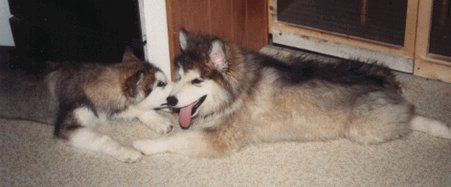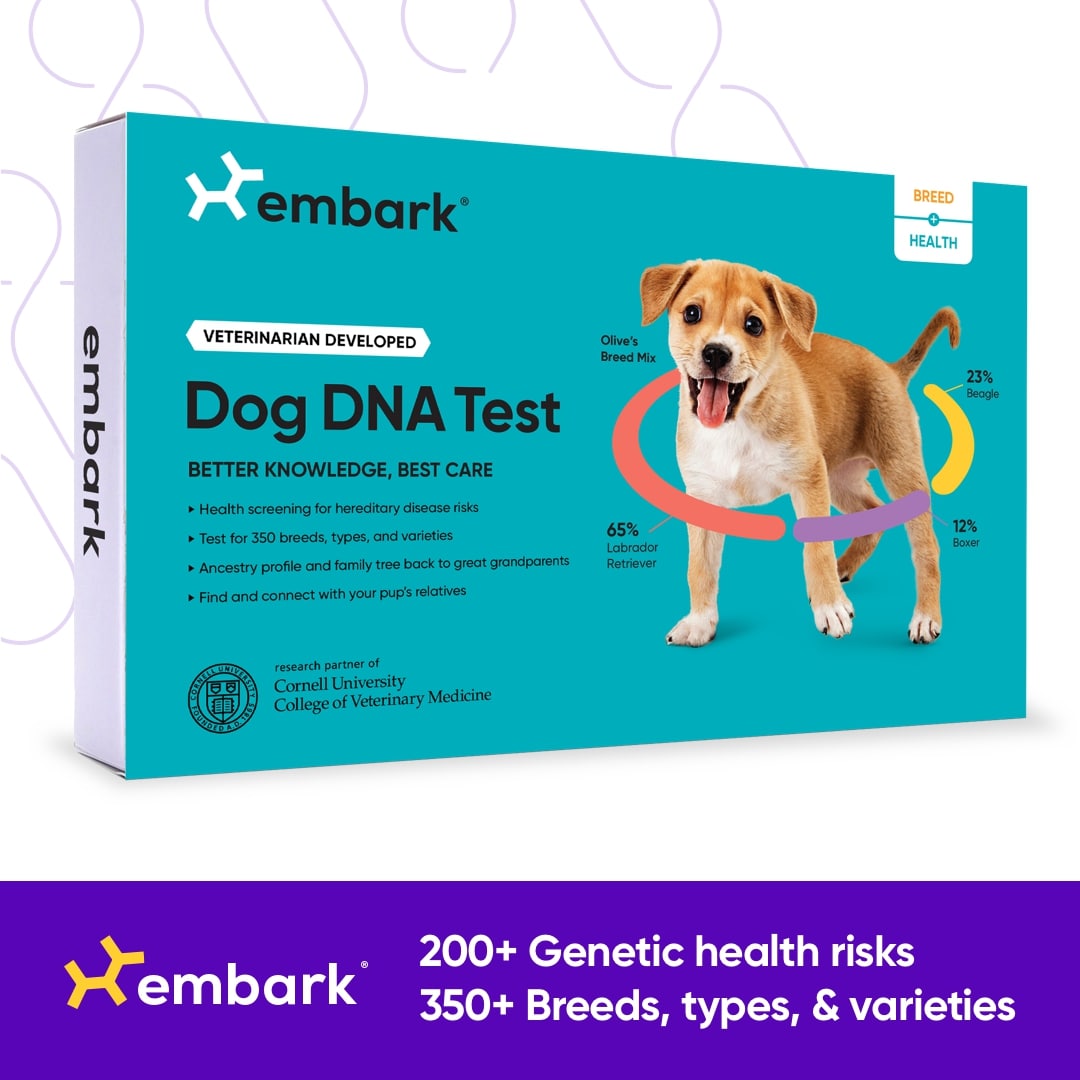Choosing a Dog Breeder - Find a reputable kennel to Obtain a Puppy
- Are you interviewed about your lifestyle, dog knowledge and family to ascertain if you would be a good match for the breed you've chosen? Does the breeder ask about a fenced yard and require you to get one? What happened to previous Malamutes? If he cares, he will want to get to know you and will want to stay in touch after the sale. To breed better dogs, it's important to know how his puppies turn out as adults - even the ones that are Malamutes!
- Is he up-front about his experience, reasons for breeding these two particular dogs, explaining what he expects to accomplish? If it's all show wins and brags, dig deeper. Is he breeding to feed an ego, pay for showing, or to improve Malamutes? Do you feel comfortable with this person, or are you kept at arms length? Do you feel he's answering your questions honestly? Could you consider this person a friend you can call with a really DUMB question? We all have dumb questions now and then.
- Does he use a written contract that spells out his guarantee in detail and what he expects you to do take care of the dog properly? Always ask for a copy of the contract. Beware of breeders that don't use one or use a contract that doesn't "say" anything. A contract that is not specific is a useless one. A contract that will only guarantee against a health problem if the dog is returned is like not having one at all. Will you really want to give up your beloved Malamute if it became dysplastic at two? Probably not! Many breeders won't guarantee "Malamute quality" puppies at all - at least they're honest about not having one.

- Where does he raise the puppies? Go see for yourself, it may be different than you imagined. A Malamute puppy should be raised with lots of social interaction with people. The facilities should be clean. The pups should be clean, alert, clear-eyed and eager to meet you. Will he choose or help you choose the puppy? If he lets you "pick", do you know what you're looking for? A dominant puppy can be a handful, and a shy puppy can grow up a fear biter if not handled properly. Do you have the experience to choose and raise a puppy like this?
- Will the breeder let you see ALL the puppies? The Mom? The Dad if on the premises? Dad may not be available if he lives some distance away, but you should be able to meet as many of the breeder's dogs as possible. When are the puppies taken from their mother? When do they go home? Puppies that get to socialize with adult dogs and don't go home too soon will be less dog aggressive and better socially adjusted. Does he do all the recommended health checks on the parents?
- Will the breeder take his dogs back? For ANY reason? No excuses here! Has he done it before for someone else? Sure, you know you want this puppy forever, but...what if your circumstances changed drastically and you had to give him up? (People die, divorce, lose jobs, move ...). Can you depend on the breeder to give your pup (even at an advanced age) a good home or find him one? Ask how he would handle this (some want YOU to place the pup because they can't be bothered - not a good sign). The breeder will have better resources and more experience in finding good homes for your dog than you, especially if your life is in turmoil at the time.
- Does he abide by the AMCA code of ethics if a member? How many litters does he have each year? How often does he attend dog shows? Are surplus litters financing his showing? If there are more than a couple of litters a year, how does he find time to socialize the pups properly? Especially if he works all week and is gone every weekend to a show. On the other hand, if he never shows - how does he know if he is producing quality dogs? It's not because of winning and losing. Breeders that don't show don't have the benefit of others' experience, opinions and suggestions to improve his line.
- Have you met his Malamutes and had the opportunity to get to know them? Do you like the personalities of your puppy's relatives? What THEY are, is often what HE will become in temperament as well as looks.
- Can you call the breeder after the sale and expect answers to your questions? Is each litter special in some way? Will he help in training and grooming if you need it? Will he show you how to clip nails, brush out the coat properly, make a correction to an uppity puppy if you need that kind of help? This is why you are paying more than the "newspaper price" for your puppy from a reputable breeder - you are paying for his help and expertise. Ask for references. Are others that have his Malamut puppies happy with the breeder and his support after the sale?
- Will you get the AKC papers when you take your puppy home - either the blue slip or the AKC registration? If they are not available now, when will you get them? Is it in writing - preferably in the contract? Does he require you to spay/neuter a Malamute puppy? Is your Malamute on limited AKC registration? The best know only dogs of quality should be bred and will always sell Malamutes with these restrictions. Also, no litter is ALL show quality.
- Don't let the cost be the determining factor in which breeder you choose. A breeder sets his price based on expenses and no more than a quality home will be able to afford. Health screening, quality food and vet care are expensive. And yet, you will likely pay less from a breeder than a petshop (there is no middle man or built in "profit").
- If you are searching for puppies on the internet PLEASE visit the breeder in person and see how they are REALLY raised. Photos can be deceiving, easily altered and of a totally different place - how would you know? Looking at the backgrounds (mud/feces?) and foregrounds (cages, uncombed puppies?) tells you more than anything said about how the dogs are raised and maintained. Anyone can insist they socialize properly - but do they? How can you socialize through bars? Would YOU trudge through deep snow on a freezing day to play with puppies in a garage or barn on a cold dirt floor? How long would you stay? Would you play with them several times a day? If puppies always seem to be available, or there is more than one or two litters available at the same time, you can bet it's become a lucrative business and the puppies are just merchandise.
- Don't be turned off by a breeder willing to honestly share his lines' health problems with you. He may tell you he has this, that and something else, or may say he doesn't know. Be glad he is honest with you, and realize there are many many more out there that will never tell you what problems they have. No line is perfect, no line free from all problems. It's just some health issues are worse than others, and some you can live with and some you can't. It's much better to know what may happen, and have the support of an honest breeder - than go with the breeder that tells you they "NEVER even check --hips, eyes, etc.-- because they NEVER have any problems"...(and you discover later all the "skeletons hiding in the closet").
- Last of all, and maybe most importantly, are YOU honest with the breeder? Have you told him your expectations, doubts, lack of experience or knowledge in certain areas? Have you tried to educate yourself about your chosen breed? Have you been honest about where and with whom the dog will live? Breeders hate nothing more than to sell a puppy to someone with "all the right answers" only to find out they know nothing and won't abide by their word. The biggest loser is the dog that goes to a situation it may not be suited for.
Puppymills are getting smarter...they're now marketing themselves as "professional breeders"
What they DON'T tell you...(a rebuttal)...
A "professional" would not have dogs living in filthy cages with little human contact over the course of their lives. If you have 10 or 20 breeds and hundreds of dogs, how much can you know about each one? And how do you meet this "professional breeder" to ask his help? Especially when you buy his puppy from a petshop thousands of miles away? Good luck finding him! A Malamute shop will provide you the AKC registration - which has a NAME. Nothing more.
The way he stands behind the purchase is he'll rely on the petshop to refund your money - if you can get them to part with it. Read your sales contract carefully - does it include hip dysplasia, blindness, genetic disorders? Most reputable hobby breeders will give a health guarantee far better than a Malamute shop will give. As for being a "professional", that doesn't guarantee anything, except that in the next shipment of puppies, most will be alive (sick doesn't count). A well rounded breeding program includes the TOTAL animal. Health, longevity, conformation, and temperament are the cornerstones of good breeding but is difficult to accomplish when hundreds of litters a year are bred, housed in abysmal conditions and the first priority is profit!
A "professional" will have hundreds of dogs of many breeds calling himself "well rounded" - but how much will he know about any particular breed? He can't say health...etc. was HIS cornerstone of good breeding ...or the puppy's socialization...so he doesn't. The local and federal laws state the absolute minimum conditions required to house animals and says nothing about their quality of life or socialization. What does it say about these breeders that lawmakers HAD to enact such laws? Typically such laws have yet to be imposed on hobby breeders because they generally regulate themselves through peer pressure.
The USDA has only a few inspectors for the entire U.S. so rarely check, unless a serious complaint is filed. The minimum conditions basically mean you can't starve, kill or torture your animals - little more. It says nothing about breeding a bitch every season until her health is gone, dirty food and water, constant confinement and filthy conditions. Would YOU want to live your entire life pumping out puppies in a little wire box that's rarely cleaned so the "professional" puppy farmer can make a good living with the profits from your babies? When done for profit, dog breeding encourages the breeder to skimp on shots, health tests, veterinary care and food and to breed as much as possible to get the biggest profit possible. If they didn't, there wouldn't be any profit - ask a hobby breeder! Also, you will typically pay much more for a Malamute shop dog of dubious quality than you will pay for a quality pup from a hobby breeder. In dogs, price does not always equate with quality. A Malamute shop has to pay the puppy farmer, the middle man that transports the dogs, and make his own profit - hence the inflated prices.
And my favorite quote "the inexperienced Breeder doesn't understand all of the health issues ... he has only seen a limited number of litters!!! Would you trust a doctor to perform an operation on you, if they had only done it once a year? " Hobby breeders are not "inexperienced" - it's just that we spend our time researching how to breed the best dogs rather than growing puppies as a commodity. Proper breed traits are only passed along when you actually breed two reasonably decent specimens of the breed together. If you have a hundred siberians, Malamutes, various husky breeds - just how likely are you to occasionally "mix up" the papers (on purpose or by accident)?
A hobby breeder may only have a few dogs himself, but has access to thousands of excellent quality dogs by the nature of a common interest with other hobby breeders. Dog shows provide a place to meet others with excellent dogs and contacts. You can't equate a Doctor to a dog breeder (interestingly, they have removed this anology from their site! they originally said would you rather have a doctor that only operates occasionally vs. one that operates all the time...) A better comparison would be comparing a fast food cook (cranking out those burgers) with a Gourmet Cook (the hobby breeder). They may not cook as often, but the quality is MUCH better.
And more... Am I a "Snob Breeder" that wants to see your house and find out if my puppy will fit your life style? Heck, YES! And proud of it. I feel I can honestly say none of my puppies were bought as a whim - but as a carefully added member of the family. And guess what, I continue to invade your privacy by talking to you occasionally so I know how you and the puppy are doing - even as an adult! Why? Because I CARE. I want to be there to help you if you have problems, provide insight into your puppy's temperament, health background, relatives and training. I want a puppy from us to be the very best dog you have EVER owned in your life.
Look for a puppy that is.... (ours were)
- Very well socialized
- Temperament tested
- Chosen just for you (because you don't want you to get more Malamute than you can handle)
- Have a head start on potty training
- Have a head start on leash training
- Are Vet checked for health problems
- Are carefully planned to make sure the puppy is healthy, and has good temperament as much as possible
- Are wormed at least twice and cleared by the vet
- Has their first vaccinations
- Has eaten supplemental foods beyond puppy food such as hamburger, chicken, yogurt and healthy treats
- Is fed a premium food
- Is Microchipped
- Lets you pick the AKC name
- Breeder takes care of the AKC and Microchip registrations
- Pup is not taken from Mom too early
- Pup gets to socialize with adult dogs as well as puppies
- Play with children early
- Are started on heartworm prevention (depending on time of year)
- Are raised in our home 24/7 (not put outside in a kennel once they get a certain age)
- Get to experience car rides
- Always welcome a dog back if circumstances ever change or their new home can't keep them
- Use the best vets for better survival rates
- Nails are cut regularly
- Pups are brushed and handled regularly
- Pups are picked up and cuddled constantly
- Are loved dearly by us
- Get a bath when needed - are clean
- Learn house and dog manners and socialize with adult dogs
- Get lots of safe visitors (the other puppy homes and friends) so they are not afraid of strangers
- 24/7 Support from the breeder if needed
- Contact with other litter owners who are supportive and helpful
- Mom is fed premium food throughout pregnancy and nursing
- Puppy collar and ID tag
- You get to know all the puppies, not just one (and ofttimes their families too)
- Pup goes home with a familiar toy which has mom and siblings scent for comfort
- Visit their new homes (nearby ones) before they go there permanently when possible
- Are NEVER shipped
- You are able to visit the puppies often once Mom is comfortable sharing them
- Breeder gets to KNOW you and you are the best home they can find
- Pups grow up in an enriched environment (toys, pool in summer, inside and outside playtime)
- Pups grow up in a clean environment (not outside in dirt)
- Learn the word "no", their puppy names and other useful words (off, outside, come) that makes them fast learners once they go to their new homes
- BONUS..... a Puppycam! so you can check in on the puppies daily and watch them grow up even if you can't always visit
- We did all of this which is why our puppy owners always came back when they want another Malamute
More information & Helpful links...
Life in a Malamute Puppymill by Golden Years Malamute Rescue
An excellent article by the Malamute Help League (a rescue organization) can also help you choose.
Visit the Alaskan Malamute Club of America's site that contains excellent information about buying an Alaskan Malamute, including genetics, health, questions to ask yourself, and more suggestions for choosing a breeder.




























